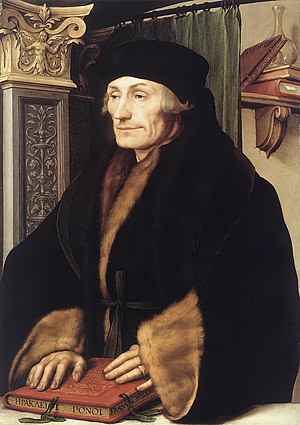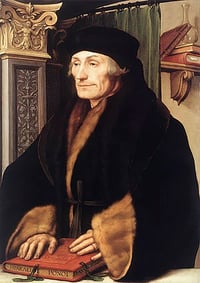Search for topics or resources
Enter your search below and hit enter or click the search icon.
July 10th, 2012 | 4 min read

For Erasmus, grace is active in our acting, in the beauty of virtue displayed that engages and transforms our affections, allowing us to play a part that becomes our own as we play it. […] Erasmus subverts the distinction between acting and being acted upon, fiction and reality, hypocrisy and honesty. Accepting the essential theatricality of virtue involves embracing a paradoxical convergence of outer and inner, ideal and real, grace and nature, other and self. It gives up the preoccupation with control betrayed by the need to draw clear distinctions between self and not-self, acting and being acted upon, giving and receiving.
– Jennifer Herdt, Putting on Virtue: The Legacy of the Splendid Vices1
It's time to reconsider the phrase, “It wasn’t me. It was God.” This phrase, often used by individuals who have accomplished things they consider impressive, has two purposes: 1) to deny credit to the self and 2) to give credit to God.
Yet it's problematic because it draws too strict a bifurcation between divine and human agency. What's more, the phrase carries within it an inadequate account of humility.
As Herdt writes in the above, “For Erasmus, grace is active in our acting[.]” Setting aside his semi-Pelagian tendencies for a moment, we can join Erasmus in recognizing that God works through human agency without overwhelming it. There is no reason to be ashamed of our agency, least of all when we have done something praiseworthy. Grace is active in our acting.
Consider Paul’s claim, “I discipline my body and keep it under control, lest after preaching to others I myself should be disqualified” (1 Cor 9:27).2 It is Paul who disciplines his body and keeps it under control. Is it also God, through Paul? Of course, but Paul does not think it necessary to deny his own agency in order to affirm God’s.
 Desiderius Erasmus (1466/69–1536) in a 1523 portrait by Hans Holbein the Younger. (Photo credit: Wikipedia)
Desiderius Erasmus (1466/69–1536) in a 1523 portrait by Hans Holbein the Younger. (Photo credit: Wikipedia)
Affirming that God works through our agency helps us to be alert to the development of character over time. God not only is active in our acting, he is active through the ongoing transformation of our dispositions. Herdt completes the sentence quoted above by saying, “For Erasmus, grace is active in our acting, in the beauty of virtue displayed that engages and transforms our affections, allowing us to play a part that becomes our own as we play it.”3
That is to say, God changes us as we act, so that repeated virtuous actions become habits as we fall in love with the image of Christ that we begin to see in ourselves. “It wasn’t me; it was God,” suggests that I do not need to take seriously the fact that I am (gradually, in fits and starts) becoming more like God.4 Whatever I have accomplished, I have done it because God has created me in his image and is refining me by his Spirit to be more like his Son.5
The lurking issue beneath the phrase is how to conceive the relationship between divine and human agency with regard to the good deeds of Christians. Herdt invites us to join Erasmus in “giv[ing] up the preoccupation with control betrayed by the need to draw clear distinctions between self and not-self, acting and being acted upon, giving and receiving.” Was it I, or was it God? It was both. In Christ, the Holy Spirit in some sense unites the self with God. As Paul says, “It is no longer I who live, but Christ who lives in me” (Gal 2:20).6
Yet if the phrase is meant to connote humility, then we need an account of the virtue that allows us to recognize our own praiseworthy actions. Augustine provides just such an account by defining humility as the acknowledgment of dependence on God. This simple definition clears away any confusion between humility and self-deprecation. It is not humble for me to deny my own goodness or ability. It is humble for me to recognize what God has done in me and to be awed by it, because I am simultaneously aware of all my wickedness and corruption that—were grace not active in my acting—would surely prevent me from doing anything that could bring glory to my Lord.
Peter Kreeft tells a story about how in heaven I will be exactly as pleased when someone else paints a masterpiece as I am when I paint a masterpiece. Freed from insecurity and envy, I will rejoice freely when God is glorified, whether through my abilities or through another’s.
Perhaps, then, we can feel free to acknowledge our dependence on and gratitude to God without finding it necessary to deny our own involvement in our accomplishments.
1 Jennifer Herdt, Putting on Virtue: The Legacy of the Splendid Vices (Chicago: University of Chicago, 2008), p. 119.
2 All Biblical quotations are taken from the English Standard Version (ESV).
3 Is Herdt providing an Edwardsian reading of Erasmus? The precise arrangement here of beauty, virtue, and the transformation of affections is reminiscent of Jonathan Edwards’ language.
4 See 2 Cor 3:18; Rom 8:29; Eph 5:1; Lev 20:26.
5 We might argue, along the same lines, that there is not enough emphasis on sanctification of the whole person over time in the WWJD brand of popular ethical reflection.
6 The deepest account of the relation between divine and human agency that I am aware of is Jonathan Edwards’ Freedom of the Will. Readers interested in a more detailed delineation of the type of compatibilism suggested by the present discussion cannot do better than to look to Edwards.
